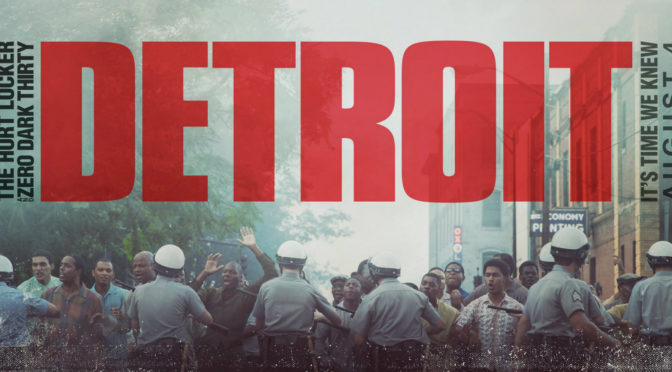Working again with writer/producer Mark Boal to make a historically based film, Kathryn Bigelow (The Hurt Locker) leaves military stories behind for a period piece set during the Detroit riot of 1967. As a brief, but informative intro animation explains, the city of Detroit had become increasingly segregated with many of its black citizens living in the crowded inner city patrolled by a predominantly white police force. A large-scale raid and arrest of an unlicensed bar leads to riots, city-wide destruction, and the deployment of the National Guard. The film follows an up-and-coming doo-wop group led by Algee Smith (Earth to Echo) as they retreat to a nearby motel to avoid the riots, only to be attacked by the local police.
The film is shot in a quasi-documentary style. Bigelow has used this technique before and she leans even harder into this direction here. She uses an unstable camera that rapidly whips between subjects and zooms in and out constantly as if a cameraperson is rushing to capture live action. This makes the film incredibly immersive and it would be easy to forget that this isn’t found footage from the actual time. Bigelow chooses to interweave real news video and photographs which makes this distinction even harder. She is also an expert at blocking her scenes. And by that I literally mean blocking. The film almost always features groups or crowds and the characters will routinely burst into frame and obstruct the camera’s view causing it to have to readjust around them. These cinematographic choices create a palpable feeling of boots-on-the-ground frenzy.

There are times when the story can strain your patience. The film’s climax is a slightly overlong interrogation inside a motel where three Detroit police officers repeated assault and, in some cases, kill the mostly black tenants for a crime they have no physical evidence of. This depiction dramatizes an event using witness testimonies so, as the film states in the end credits, some liberties were taken during the recreation. The local police, led by Will Poulter (The Revenant) in an appropriately repulsive performance, continuously fail at drawing out a confession and the film shows each of their futile attempts. These start to wear thin as you wonder why the police, or the filmmakers, haven’t moved on already. At 143 minutes long, the movie would have improved with some editing in this particular scene. The incompetence, the racism, and the cruelty of the police becomes evident quickly which makes the extended sequences unnecessary. Bigelow may be using the length to emphasize the cast’s protracted suffering but the point has already been made and further emphasis without additional depth becomes somewhat redundant, even if these scenes are rooted in fact.
Despite some pacing issues, Bigelow uses the injustice on display to create a sense of terror and urgency. For these characters, the slightest misconstrued movement or innocuous comment could lead to a ruthless beating or worse, so every interaction is fraught with danger. It’s impossible to separate the events depicted in the film from our current problems in America. The actions of the police in the film combined with the horrifying news headlines of the past few years become both hideous and infuriating with later scenes involving John Krasinski (The Office) as a police union lawyer being blood-boiling in their blatant inequity. The inhumanity displayed by the authorities towards people of color makes for more than just a disturbing movie. It has been some time since we have had a film that can truly be described as polemic, but Detroit deserves that descriptor. Bigelow’s indictment of systemic racism and injustice in 1967 Detroit is an upsetting look into the tribulations of minorities at the hands of law enforcement that is infuriating and, sadly, relevant to our present world.

4/5 stars.
